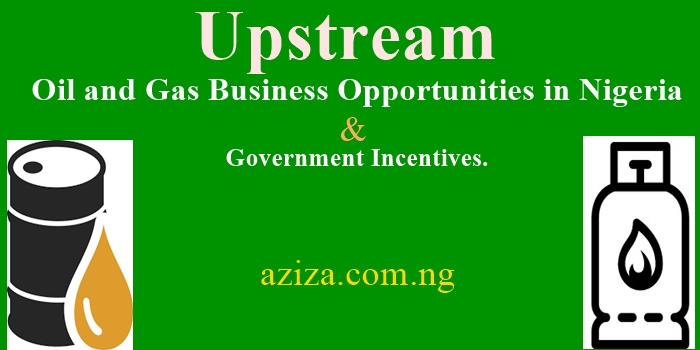
In this blog, we cover some of the Oil and Gas Upstream Business Opportunities in Nigeria and some government incentives. How to start to invest with some suggestions on how to go into some of the Upstream Oil and Gas Business with business support services.
Oil and Gas Upstream in Nigeria is open to public/ private sector participations to all nationals of the world but with regulations from government body. What this mean is, you can come from any part of the world to invest in Nigerian Oil & Gas sector businesses and make good returns.
Read: Nigerian Local Content
One of the reasons to grab the Oil and Gas Business Investment Opportunities in Nigeria is, Nigeria is one of the countries that has low tax rate with 7.5% Value Added Tax and 30% on company income tax. Nigeria also has various tax incentives intended to encourage investment in key sectors of the economy.
Registration/ Formation of Business/ Company
Registration of company or Incorporate of company in Nigeria is solely done by Corporate Affairs Commission (CAC). It takes a minimum of 4 – 14 days to complete. The minimum share capital is one (1) million share capitals for Nigerian citizens. There are some peculiarities.
For foreign citizens or company that want to start Oil and Gas Business in Nigeria, read our post on “how to start business in Nigeria as a foreigner” as there are some peculiarities with foreign ownership that you need to know. Also, feel free to Contact us for specific needs.
The Upstream Oil and Gas
The oil and gas business industry in Nigeria is divided into three major sectors: Upstream, Midstream and Downstream sectors. The Upstream Production refers to all the activities needed to gather the materials required to create a product. The upstream stage of the production process involves searching for and extracting raw materials. The upstream part of the production process does not do anything with the material itself, such as processing the material.
Read: Oil & Gas Compliance and Support Services
This part of the process simply finds and extracts the raw material. In a more general sense, “upstream” can also refer to any part of the production process relating to the extraction stages. In the Nigerian oil and gas industry, locating underground or underwater oil reserves characterizes the upstream process. In addition, the upstream process in petroleum involves bringing oil and gas to the surface. The upstream stage in the production process may also manifest itself as a supplier providing raw materials (raw crude) to refineries/ manufacturers or other businesses that ultimately process the materials.
Upstream Business Opportunities
- Surveying – tropical and planimetric; and sea bottom survey.
- Civil Works- mud pit construction, concrete works at rig sites.
- Seismic data acquisition and interpretation.
- Drilling operations.
- Pipelining
- Crude oil transportation and storage.
- Exploration and production of oil and gas products.
- Manufacturing of consumable materials in exploration such as explosives,
- Detonators, steel casting, magnetic tapes etc.
- Search for development of local substitutes for items such as medium pressure valves, pumps, shallow drilling equipment, drilling mud, bits fittings, drilling cement etc.
Gas Exploitation (Upstream Operations)
Fiscal Arrangements are reviewed as follows: All investment necessary to separate oil from gas from the reserves into suitable products is considered part of the oil field development. Capital investment facilities to deliver Associated Gas in usable form at utilization or transfer points will be treated for fiscal purposes as part of the capital investment for oil development. Capital allowances, operating expenses and basis for assessment will be subjected to the provisions of the PPT Act and the revised Memorandum of Understanding (MOU).
Read: Oil & Gas Compliance and Support Services
Brief in Nigerian Oil & Gas Upstream
The Upstream reserves increase has grown to 25.93 billion barrels of oil, 3.80 billion barrels of condensate and 158 trillion cubic feet of gas, as at December 2000. The introduction of various incentives by the Government has fueled the increase oil reserves and gas utilization. Government is still making policies to further the increase of oil reserves, a Memorandum of Understanding (MOU) was negotiated and agreed to guarantee a notional profit margin of US $2/bbl. This was revised to include the Reserves Addition Bonus clause, which qualify the operator for a tax credit for additions to reserves that exceeds its production for a year.
Opening up of other basins, which are blocked into concessions and awarded to competent entrepreneurs for exploration and development (Fig. I). The basins are Benin, Anambra, Benue Trough, Chad and the Deep and Ultra-deep offshore area of Nigeria. The first four of these basins are relatively un-explored while the Deep and Ultra-deep offshore are now partially explored. The opening-up increased the number of companies exploring for hydrocarbon in Nigeria from just a few to 59 with 46 of them discovering oil, gas and/or condensate in significant qualities. This brought about the conversion of 91 of 177 Oil Prospecting Licenses (OPLs) to Oil Mining Leases (OMLs). Seventeen of these companies have gone into actual production. In the deep and ultra-deep offshore terrain, 12 companies have discovered oil and gas in commercial quantities. This encouraging result made the Government to open up 22 new blocks to interested entrepreneurs for competitive bidding process in year 2000. Government also awarded 24 of the 200 fields classified as marginal by operators due to low ranking in their investment portfolio and/or remoteness to existing facilities to 32 local companies.
These 24 Marginal fields have an estimated reserve of about 300 million barrels of crude. Similar drilling that target deeper pools are bound to yield more reserves as depth of investigation was erstwhile limited to about 3000 meters. Government encourages drilling that will target deeper horizon by giving exploration, first and second appraisal incentive to wells that investigate depths in excess of 500 meters beyond that of the deepest well in the field.
